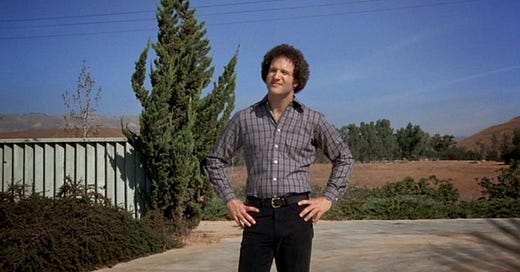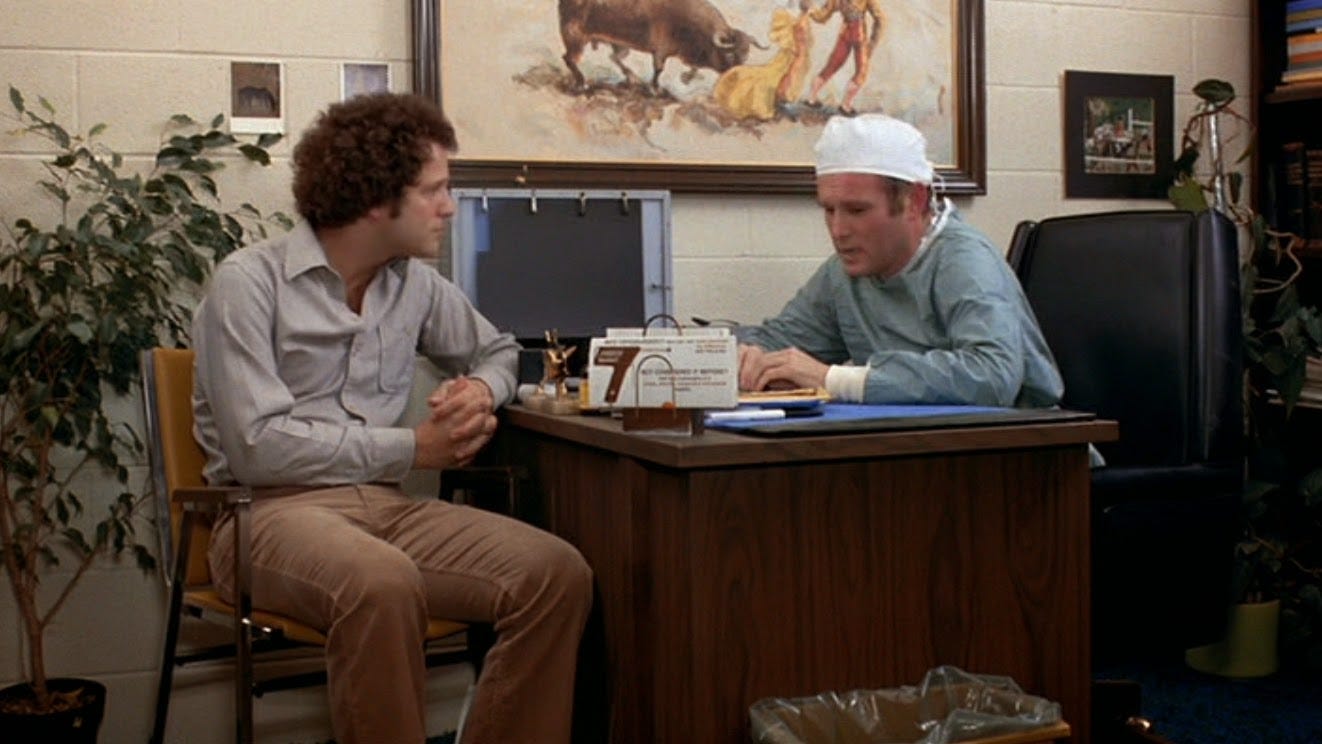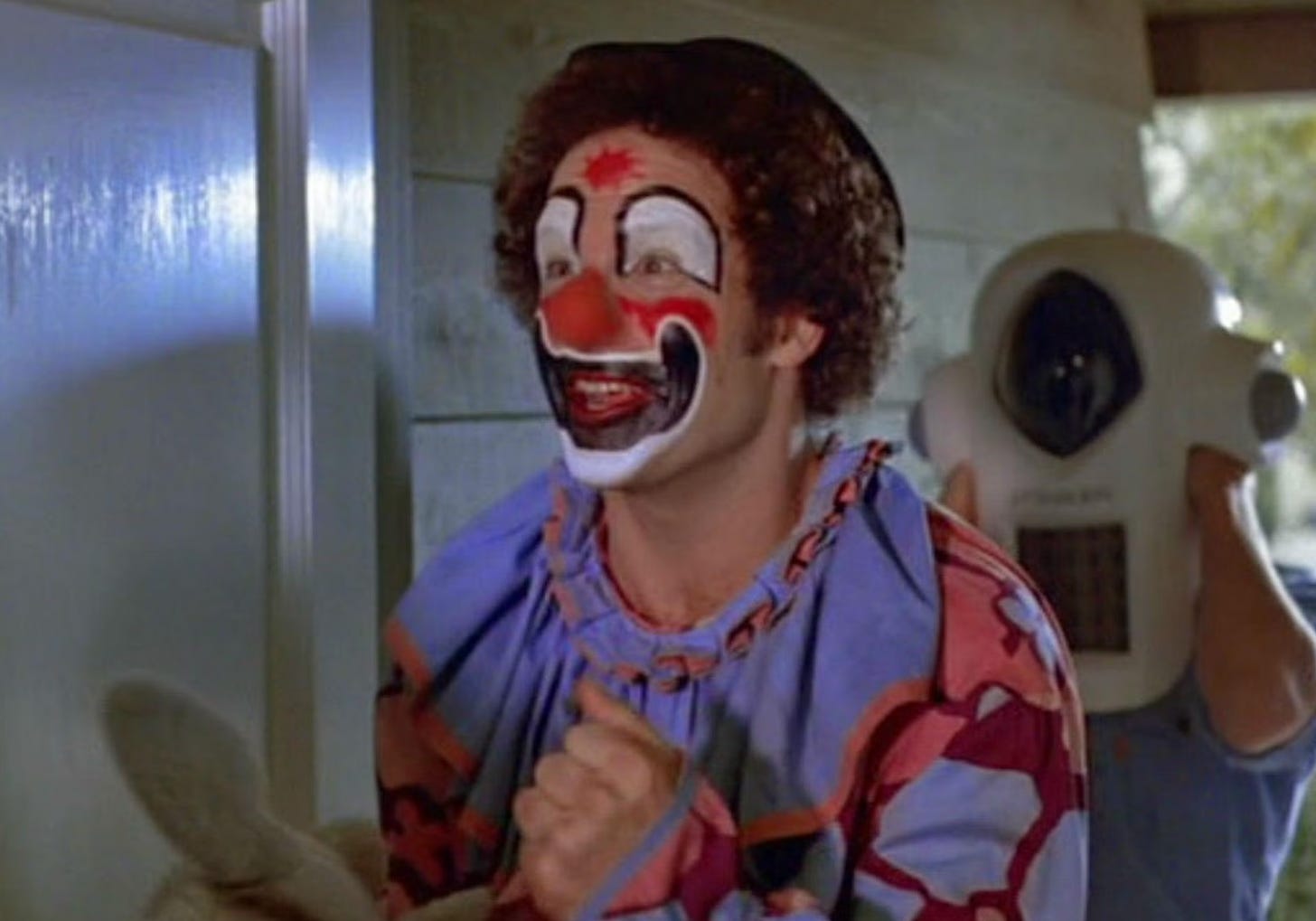Introducing "Albert Brooks"
By playing himself in his debut feature 'Real Life,' Albert Brooks set the stage for a career of ruthless self-examination.
“Wouldn’t this be a great world if insecurity and desperation made us more attractive? If ‘needy’ were a turn-on?”— Albert Brooks, Broadcast News
In 1976’s “The National Audience Research Institute,” the last of his six shorts for Saturday Night Live, Albert Brooks visits a panel of doctors at a research facility outside Phoenix, Arizona, to better understand what people like and don’t like about him, so he makes the necessary adjustments. Among the tests is a live video feed where viewers are supposed to talk to Brooks, but they’re more distracted by the technology, which again becomes an issue when one viewer is hooked up to a computer to watch Brooks’ previous SNL short, “Sick in Bed.” Another guy simply hates Brooks’ comedy and argues with him personally while the researchers observe their exchange. The institute winds up issuing an 800-plus page report, which Brooks intends to read when it’s been synopsized for him. He’s a minor celebrity, after all. He can’t be expected to sweat the details.
Brooks’ career as a comedian and filmmaker had been leading to this moment. His brilliant stand-up appearances on late-night television shows were all about comic destruction, like the less-than-dazzling ventriloquism of “Dave and Danny” and a Tonight Show routine where he claimed to have run out of material five years into his career, all while resorting to “cheap tricks” like taking down his pants and hitting himself in the face with a pie. His 1973 album Comedy Minus One includes a mirror and a script that allows the listener to take part in his act and its 1975 follow-up, A Star is Bought, is premised on him broadening his appeal by creating tracks targeted for radio play across the dial. His first short, expanded by a fake advertisement and questionnaire he wrote for Esquire magazine called “Famous School for Comedians,” toured the inside of such an institution, where students workshop bits and learn the art of the spit take. When you combine the bottomless narcissism and insecurity of A Star is Bought with the snooty academic rigor of “Famous School for Comedians,” an institute where professionals explore your flaws as an entertainer seems like the natural next step.
And so, too, was Real Life, Brooks’ first feature, which was released on Criterion this week, along with 1996 comedy Mother. Brooks has played the lead role in all seven of his films, but Real Life actually casts him as “Albert Brooks,” a Hollywood entertainer who descends on the greater Phoenix area to conduct a half-commercial/half-scientific experiment in studio filmmaking. On the disc’s special features—which include the 3-D trailer, on my personal shortlist for greatest ever made—Brooks talks about his writing partner Monica Johnson (Harry Shearer also gets script credit), who’d work with him again on Modern Romance, Lost in America, The Scout (which he didn’t direct and was butchered), Mother, and The Muse. He credits Johnson for her particular insight into the “Albert Brooks” character, and it’s pretty clear that he’s talking about more films than Real Life, the only one besides Looking for Comedy in the Muslim World where he explicitly plays himself. The names would change—Robert Cole, David Howard, John Henderson, etc.—but the screen persona would stay more or less the same. It would even carry over to other projects, like his heartsick reporter Aaron Altman in Broadcast News.
There are many arguments to be made for the greatness of Brooks as a writer-director—his gift for ingenious conceits, carried over from his stand-up and late-night appearances; his willingness to use comedy to square up to life’s most fundamental issues; his subtle observational camera style, etc.—but his true potency may lie in his total lack of vanity, which may also explain why his films have struggled at the box office. The cinema is full of director-stars, even ones willing to dip into self-deprecation, but Brooks makes personal films that rigorously explore his worst image of himself. His neuroses are almost never a form of ingratiation, like Woody Allen and his imitators, but often genuinely ugly and unflattering.
In Modern Romance, his on-again/off-again relationship with a girlfriend he doesn’t even like exposes such a pathological jealousy that I wrote a piece likening his character to Jake LaMotta in Raging Bull. In Lost in America, he’s an ‘80s ad-exec sellout trying to reconnect with his hippie youth, but isn’t willing to give up his “nest egg” to live like the renegades in Easy Rider. In Mother, he moves back into his childhood bedroom to figure out why his life and career are so screwed up, not realizing that he’s disrupting his mother’s private life. (His revelation: She’s a failure!) In Looking for Comedy in the Muslim World, he travels halfway around the world to bomb hard with a foreign audience. Even the one exception in his filmography, the charming romantic comedy Defending Your Life, casts him as so fearful and unheroic that he’s given ho-hum lodgings in the afterlife. (Joking to Meryl Streep, who’s staying at a much better hotel, he says, “I’m at the Continental. Come over one day. We’ll paint it.”)
So who is “Albert Brooks” in Real Life? He’s an inveterate showman, for starters. When the film opens, he’s speaking to a smattering of citizens from the 5th district in Arizona, where Albert and his crew, along with a couple of top-flight scientists, intend to spend a year filming the Yeagers, a family of four, for a major motion picture. The inspiration, at least in the title scroll, is the Loud family, the stars of the 1973 documentary series An American Family, which was a sensation at the time and a comparatively austere precursor to reality television. But Albert isn’t making some dry documentary about the Yeagers, so he’s hitting this civic meeting with all the Hollywood razzle-dazzle he can muster, assuming that these yokels will expect something more from the man they presumably saw on The Tonight Show and Ed Sullivan. He ends his presentation with a lounge number featuring Mort Lindsey from Merv Griffin and “as much of his orchestra as we could afford to bring down,” and does a little light crowd work between flattering verses. One guy from Cincinnati claims to have come down to Phoenix just to watch him work.
Yet Brooks most forcefully seizes on his alter ego’s pretensions to greatness, which are constantly undermined by his commercial instincts, his complete lack of intellectual rigor, a child-like need to be the center of attention. His year with the Yeagers, certified by National Institute of Human Behavior and a psychological consultant “who’s written lots of books” (“We’re all gonna be on Jonas Salk’s coffee table!”), will bring him unprecedented glory. “We not only had a chance at winning an Oscar,” he tells the camera, “but a Nobel Prize, too.” He uses scientific data both to inflate the scope and ambition of the project (“If these tests could be converted into eggs, it would enough eggs to feed a city the size of St. Louis for two years, on a two egg per person per week basis.”) and to serve as a fig leaf to cover up his constant breaches. Turning An American Family into a studio entertainment was never going to be possible without putting scare quotes around “reality”—that’s how Real Life predicted Keeping Up With the Kardashians.
Brooks is ruthless in satirizing Albert as a Tinseltown slickster whose ambitions are as skin deep as his movie-star charisma is outsized. Before shooting can begin, the Yeagers are sent away to an all-expenses-paid vacation in Hawaii for two weeks so Albert can furnish the house he bought across the street from them. (“The living room was done in a Neo-Mediterranean style,” he tells us.) He immediately contaminates the experiment by arranging to bring the Yeagers home in a limo and then leaving them no time to recuperate before surrounding them with men operating Ettinauer cameras, which resemble astronaut helmets with a cyclops eye and omnidirectional microphones for ears. (The gags involving the Ettinauers have a 100% hit rate here.) Barely a day has passed before the mother, Jeannette (France Lee McCain), is so bothered by the crew’s presence and her husband Warren’s (Charles Grodin) entreaties that she skips town for the weekend. The project is already a disaster, but Albert keeps telling himself that anything that happens is good, because whatever happens in front of the camera is “reality.”
Yet the fun of Real Life is how untenable reality is for the movies, particularly of the sort Albert actually wants to make. Reality can give you an “unsympathetic” lead character like Warren, despite the thousands of families that were winnowed down in the scientific casting process. Reality can take twists and turns that don’t fit the narrative you want to tell, like Jeannette suddenly developing feelings for Albert or Warren further tanking his image by accidentally euthanizing a horse in his veterinary practice. And, most of it, reality is straight-up boring, between the grind of day-to-day routines and the unique pressure of living under constant surveillance, which so dramatically alters the Yeagers’ behavior that one of the consultants quits and writes an article called “Nightmare in the Desert.” (Some of the phrases in the article include the words “mind control” and “psychological rape,” but Albert says he doesn’t read bad reviews.)
The distance between the intended purity of the experiment and the “false reality” of a family living with cameras—not to mention a director who’s constantly interfering—is the stuff of future nonfiction cinema panels. But in Real Life, Albert’s growing panic over this fiasco leads to another important aspect of the “Albert Brooks” character: Desperation. When the Yeagers sink into a depression, he shows up in a clown costume to cheer up the kids, only to plead with their parents to stay with the project. He brings them on excursions to the Phoenix Zoo and for soft-serve ice cream to make them happy and “show the French what montage is all about.” And when all else fails and he needs some kind of ending to thrill his imagined audience, he charges through the Yeagers’ home with a lawn torch and lights it on fire, like the burning of Atlanta in Gone With the Wind. He has taken leave of reality, along with his sanity.
But the “Albert Brooks” introduced in Real Life was only just getting started. Though Brooks would add various nuances to future depictions of himself on screen, there’s a connection between, say, Albert fussing over the interior decoration of his home in Real Life and Brooks’ characters in Lost in America and Defending Your Life negotiating the details of the luxury car they’re buying for themselves. And the psychological harm that Albert inflicts on the Yeagers in service of his own ego is evidenced later in a film like Mother, where his investigation of self picks at a longstanding scar from his mom’s past. No doubt Brooks has spent a career exposing the flaws he sees in himself, but that’s precisely what sets him apart from “Albert Brooks.” He’s not the type to step in when things feel uncomfortable—and he’s got the box-office receipts to prove it.







One of the funniest moments in Brooks’s SNL shorts is when his daughter wanders into shot and he has to call security on her. “That’s my daughter,” he says as she’s led away. “You won’t be seeing her again.”
This is also playing in Alamo’s Time Capsule 1979 series. So far I have tickets to see it, The Deer Hunter, and Stalker, all for the first time.